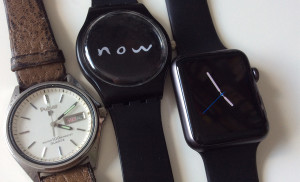I don’t think I’ve ever asked you about your religion. Never thought about it. Can’t see that it matters. But mine is going to come up today because I’ve just produced an event featuring kids from a Church of England school. I was commissioned by the vicar and because he also got Rowan Williams to come speak at it, I ended up having supper with the ex-Archbishop of Canterbury.
Also, it was in an Abbey.
You can see why I feel it’s relevant to tell you that I’m orthodox atheist.

Listen, I ‘fessed up immediately with Fr Philip Wells of Polesworth Abbey: I hadn’t thought of the orthodox atheist joke yet but I told him that I am “absent religion”. I would not have taken the gig without making that clear but while it didn’t matter to him, I found that it did to me.
This has been a couple of months in the making and throughout it all I was doing what I do, I was doing what you’d do, I was thinking about the brief, weighing up the timescales, seeing what resources there were, what resources I needed, what I could do, how the day and evening would run, all that usual stuff. I also went through my usual stuff of, frankly, fretting. I fret, I worry, I panic: this has to be good, this must be great. Whether I am up to the job or not, I am the one doing it and we don’t get to have a second go with anyone better if I get it wrong.
Nothing new there: that is an average day for me and I can only wish that I could get a little more blasé about things sometimes.
Mind you, if I did, maybe I would also get blasé about the result and when I left that Abbey last Wednesday night, I wasn’t blasé. I found I could flip a switch in my head and choose whether to be ecstatic or relieved. Overjoyed or exhausted.
What we did was a kind of mashup celebration of Polesworth Abbey’s history and the poet John Donne who has a deep connection with the place. Plus there is this book from 450 years ago which is written in that completely unreadable but beautiful ancient text and comes with a mystery. For there is a page missing in the middle. Stolen? Vandalised? Or just whoops, I spilt my tea, give me that?
Naturally we’ll never know but Fr Philip read me like, well, a book, and so the first thing he told me was about this and I was inescapably hooked. Hooked by the mystery, hooked by how this was something I could grab on to that was text, that was writing, and while it’s a religious book it is people communicating. It’s people writing with certain assumptions, certain presumptions that the reader has the same background, the same interests, that they share common cultural references and, yes, that they believe the same thing.
Plus I could see a joke.
Fr Philip wanted something to do with what could or perhaps should be on that missing page. So did I. Yet I couldn’t write it. I don’t know why but I could not pull off the voice of this writer, could not quite make something that worked despite a lot of trying. But Polesworth Abbey is home to a Young Writers’ Group led by Alex Townley for Writing West Midlands. It’s the same idea as the one I run in Burton and I’ve visited that group before so I knew both that they were smart and that of course they knew the Abbey.
Alex and her assistant Lindsay Bailey let me borrow the group for half an hour. Usually when you’re doing this you’re creating writing exercises, you’re finding new things for the groups to explore for themselves. “Not this time,” I told them. “This time it’s a job.” I briefed them on what I needed and they wrote it. Straight away. Right there in front of me while I watched. I could get used to that.
I asked them to write a serious prayer type of thing, showing them what was in the book already and describing the style. I did also ask them to do a very not serious one, a silly one. And they did. That is one smart group.
What they did was not just create that material for me to use in the event but they also relaxed me. I had a big chunk of work in the bag and so when I then went into Nethersole School near Polesworth Abbey, I could be relaxed about what I needed them to do. I also knew that I wasn’t alone in thinking this missing page lark was so fascinating. And, my lights, you should see what those school kids came up with. I can’t name names because they’re school kids and I won’t name names because there were too many good writers and I’d be bound to miss one out.
However, there was one who made me gasp. She is a poet. Apparently – because I asked about her afterwards – also talented in maths and science. I can’t tell you her name but I know it and I’m going to be looking out for her to follow her career.
Nethersole School kids and the Polesworth Abbey Young Writers’ groups did the hard work, they wrote the tough bits, my job was to link them all into an event. I’m more interested in what they did than what I do but so that you know, what I decided was that we’d have four simultaneous events running and overlapping, intersecting. In one room of the Abbey we had three kids performing all of the missing page extracts. In the main Abbey itself we had a drama group re-enacting the archaeological digs that have been making fascinating discoveries about Polesworth. Then at the top of the Abbey we had kids reading the poetry of John Donne plus work by Gregory Leadbetter that was written for Polesworth’s previous celebrations of Donne.
If you’re counting on your fingers, as I kept doing, that’s three. The fourth was to do with how there used to be an official hermit at Polesworth. You’ve just pictured a bloke with a beard hiding out in the woods and avoiding everyone but this was a woman who was required to look after the prayer books and to give advice when asked. And she was asked a lot. I imagined Benedicta Burton being a right grump about all this – so I wrote a script for her where she got to be grumpy and rude as she guided the audience around the other three events.
I really enjoyed writing that script but I was also aware that it was a tough gig for someone to perform: you’re learning quite a lot, you’re having to be just that right side of rude where it’s funny and not believed, plus you have to be a tour guide and control people.
So many people. This is something I got wrong. Fr Phillip told me to expect around 150 people – and I think on the night it was nearer 200 who turned up – but it’s one thing knowing the number and it’s another really grasping how many people that is. In the end, there were so many that we had to change the sequence of the tour so that we could avoid people seeing things they’d just accidentally walked past.
I had two Benedicta Burtons and one Benedict Burton and, I tell you, I was as proud as a parent: they did their parts with flair and verve and cheek and they adapted as soon as anything had to change. The readers made me very, very happy, the “archaeologists” were just wonderful, but the hermits were professionals. The two John Donne readers saw that there were so many people that we’d have problems getting through it all in time and offered to temporarily become extra Benedict Burton hermits. They didn’t know the part and still they offered and I used them immediately. They will go far.
Fr Phillip tells me that his favourite moment of the night is how those John Donne readers went back to their original jobs when they had finished the extra hermit roles and performed that poetry in front of the whole audience. Difficult poems, read well. I agree completely.
Except.
I am still addicted to that book with the missing page so when my four circling events were done and Fr Phillip got to deliver the news about the archaeology finds, as he got to introduce Rowan Williams, I got to have them both do something extra. Fr Philip performed the key John Donne poem, Riding Westwards, and explained the Abbey’s connection with the poet.
And then.
I’d picked out four of the missing page pieces and they read them to the whole audience at once. Fr Philip in his own Abbey, Rowan Williams with his stunning voice, they read the children’s work. The first was that brilliant serious piece from Nethersole School and the last was from a Polesworth Young Writer. I had more trouble picking that last one as there was so much to choose from but I knew I could only have one missing page prayer that had anything silly in it. Too much silliness robs the joke and there was this one that began so seriously, so very perfectly seriously, and then takes a left turn.
You’ll have to imagine this and you’ll have to imagine the night as it wasn’t filmed but picture the ex-Archbishop of Canterbury solemnly speaking about the last supper and the “eat this in memory of me” bit followed with perfect comic timing by “do you prefer white bread or wholemeal?” before zooming off into a bit about special offer bread prices in Asda and how they are next to all the “Frozen” toys.
That Polesworth Young Writer got gigantic laughs from the entire audience.
And I got one too.
Nobody knows this was me, well, apart from you, but I wrote a line for Rowan Williams. It was a line to bridge his move from the school kids’ work to his own speech and he was up for it. It was the joke I’d seen right at the start, the gag that had leapt into my head during the very first phone call from Fr Phillip.
I feel I may have overplayed this with you now but in context, on the night, following that delicious missing page prayer about Frozen and especially when delivered by Rowan Williams, it was my best script in ages. He just said:
Let it go.
I’ve written gags for an archbishop. What would my Roman Catholic school think of that?
Actually, what do I think of that? I told you that I’m more interested in what the kids did than what I had to do but I also began this with that line about going to hell. And I said all this mattered to me. It mattered as an event, it mattered to me as a way to get good people creating something good – no, dammit, something great – but it did also affect me and my atheism. I’m still here, I’ve not budged, but after so many years of completely forgetting religion even exists, I found it fascinating to watch a different world from so close up. Fascinating and illuminating.
Possibly also embarrassing. It’s not like I asked Rowan Williams “So what do you do, then?”. But at that supper, they did say grace and for just one moment I assumed she was another guest coming later.
Please don’t tell my mother.



